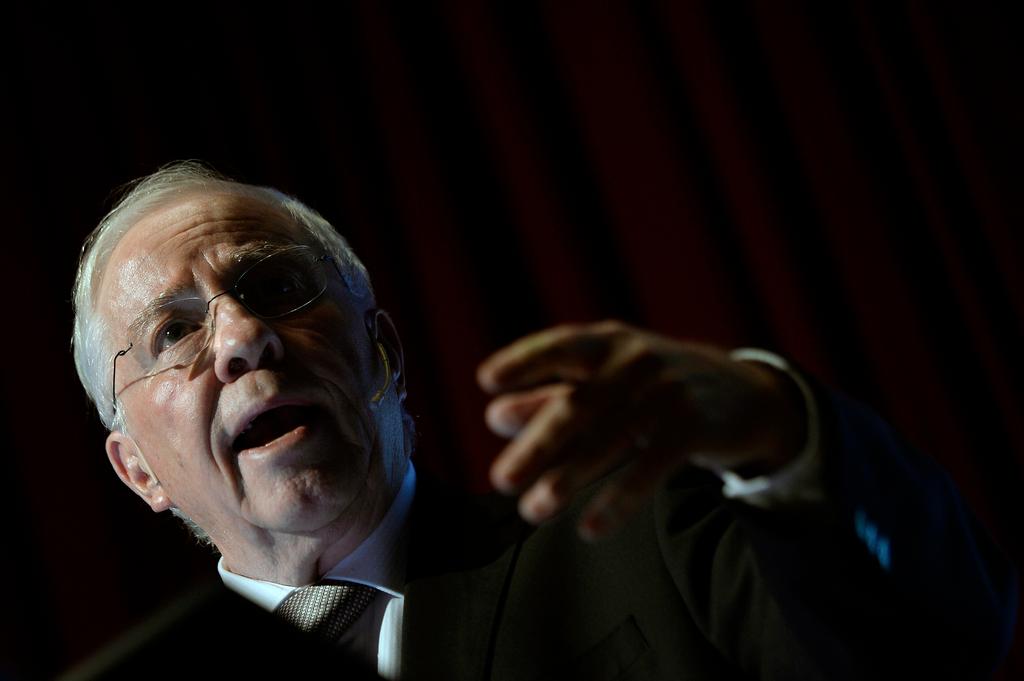Is Swiss consensus disappearing?

The debate leading up to the recent vote on deporting criminal foreigners was often emotional and confrontational. It’s one example, says political communication expert Linards Udris, of how traditional Swiss consensus politics is being replaced by polarisation.
Consensus in Switzerland is the idea that political parties and different groups in society reach out to each other and lead rational, substantial debates in order to reach a good compromise. It has been a strong tenet of Swiss political life since the country’s founding in 1848, when, during difficult phases, people were able to pull together, says Udris.
But in the last 20 years, the concept has become weaker and polarisation has come to the fore, he says. The enforcement initiative on deporting criminal foreigners was rejected by 58.9% of Swiss voters on February 28. But early polls had put supporters of the initiative in front. Its backers, the conservative right Swiss People’s Party, had used strong rhetoric and eye-catching posters to put its message across
swissinfo.ch: So consensus historically has been part of the democratic process in Switzerland.
L.U.: Yes, exactly and Switzerland is not a special case in this respect: you have lots of European countries, especially the smaller countries, for example, the Netherlands, the Scandinavian countries, where consensus among the different parties and groups has been extremely important. So this is not a unique Swiss thing. But what has been more unique in Switzerland is the speed with which the trend towards polarisation has accelerated.
I believe this trend is also a result from the rapid changes in the Swiss media system. The Swiss media system used to be a very good one, and it still is by international standards, but in the last 10-20 years it has become much more concentrated, much more tabloidised. By this, I mean that those media that offer, let’s say, a lower quality service have become much more important while high quality media have become less important in the last 10-20 years.
swissinfo.ch: The rise of the People’s Party must also be a factor.
L.U.: This is an extremely important factor and probably the main factor. The Swiss party system has become more polarised and it’s not a classical left-right division, like the left wants the state to interfere more and the right wants less state intervention. It’s more a conflict between the radical populist right that tries to stylise itself as a unique party that fights against everybody else, the system, the political elite and “all others”.
Coming back to the media factor, what we find in our studies is that the People’s Party is the party which is awarded the most media attention. You could call that disproportionate media attention because it’s far more than just the share the party has in parliament for example.
swissinfo.ch: Is that because they shout the loudest, as it were?
L.U.: Yes, you could say so. The party is, in its rhetoric, in its communication style, the party that polarises and provokes the most. Party officials know what if they launch provocative posters or introduce provocative words into the debate, media and other political parties, the cabinet, they will most likely react and criticise the party. But that’s exactly what the party wants. This helps the party in recreating its image as the party that fights against everybody else.
swissinfo.ch: So the enforcement initiative, which was rejected February 28, is good example of how we didn’t have any consensus and we had quite polarised views.
L.U.: It’s been a very emotional debate and again it recreated this image that the People’s Party fights against everybody else. My personal view is that, in the short-term, the result hurts the party because the party lost. But, in the mid- to long-term, this will again help the party because let’s not forget although the party lost, it still got more votes than it actually has. [In the 2015 parliamentary election it gained 29.4%] According to vote shares, around 40% of the Swiss population accepted this initiative, so it will still help the party and its image.
swissinfo.ch: There were some interesting comments by People’s Party grandee Christoph Blocher in the vote aftermath that the party should stop its flood of initiatives and should remember that it has two ministers in cabinet. That almost seems like a step towards consensus.
L.U.: I also found this very surprising. I’m not sure how things will work out in this sense or if this is just a short-term manoeuvre just to divert attention. But if this is meant as a serious proposition, then yes this would be a step towards consensus.
Generally, in terms of Swiss political communication in Swiss history, parties and different groups have always found a way to reach a compromise. This is part of the political culture as it were, so there’s reason to assume if parties get their act together, they can reach a compromise.
swissinfo.ch: What will the future bring, more polarisation?
L.U.: It’s always difficult to make predictions. The level of polarisation will not accelerate as rapidly as in the last years because I think it has reached a certain level. But I don’t think that this trend will be radically stopped either. And I don’t think that the media will change for the better. So polarisation will still be a phenomenon over the next years, even decades.
Linards Udris
Udris is the deputy director at the Research Institute for the Public Sphere and SocietyExternal link, at the University of Zurich.
His research interests include political communication, social change, the quality of the media and sociology of the public sphere.

In compliance with the JTI standards
More: SWI swissinfo.ch certified by the Journalism Trust Initiative












You can find an overview of ongoing debates with our journalists here . Please join us!
If you want to start a conversation about a topic raised in this article or want to report factual errors, email us at english@swissinfo.ch.